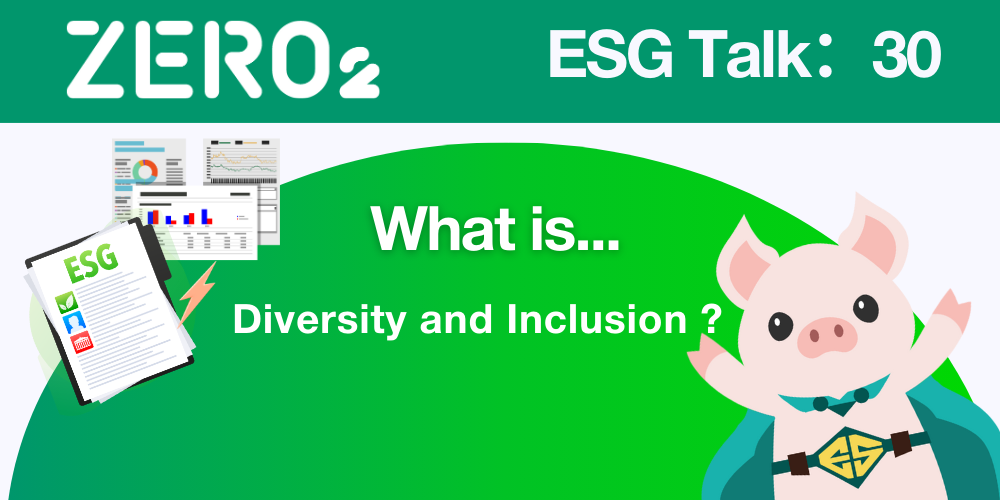 【ESPig
【ESPig Talk】
Talk】


 Today, let’s explore Diversity and Inclusion (D&I)—two key concepts that help create a fairer and more harmonious society, workplace, and community!
Today, let’s explore Diversity and Inclusion (D&I)—two key concepts that help create a fairer and more harmonious society, workplace, and community! What is Diversity?
What is Diversity?Diversity refers to the presence of differences within a group of people. These differences can include:
–  Identity: Gender, age, ethnicity, nationality, or sexual orientation.
Identity: Gender, age, ethnicity, nationality, or sexual orientation.
 Identity: Gender, age, ethnicity, nationality, or sexual orientation.
Identity: Gender, age, ethnicity, nationality, or sexual orientation.–  Background: Education, experiences, beliefs, or cultural heritage.
Background: Education, experiences, beliefs, or cultural heritage.
 Background: Education, experiences, beliefs, or cultural heritage.
Background: Education, experiences, beliefs, or cultural heritage.–  Abilities: Physical abilities, neurodiversity, and unique talents.
Abilities: Physical abilities, neurodiversity, and unique talents.
 Abilities: Physical abilities, neurodiversity, and unique talents.
Abilities: Physical abilities, neurodiversity, and unique talents.Diversity celebrates the richness of human variety and ensures that everyone has a seat at the table.
 What is Inclusion?
What is Inclusion?Inclusion means creating an environment where everyone feels valued, respected, and empowered to contribute fully. It’s not just about inviting people to the table—it’s about ensuring their voices are heard and their contributions are appreciated.
 Why are Diversity and Inclusion important?
Why are Diversity and Inclusion important?–  Fosters innovation: Different perspectives lead to creative problem-solving and fresh ideas.
Fosters innovation: Different perspectives lead to creative problem-solving and fresh ideas.
 Fosters innovation: Different perspectives lead to creative problem-solving and fresh ideas.
Fosters innovation: Different perspectives lead to creative problem-solving and fresh ideas.–  Promotes fairness: Provides equal opportunities for all, reducing discrimination and bias.
Promotes fairness: Provides equal opportunities for all, reducing discrimination and bias.
 Promotes fairness: Provides equal opportunities for all, reducing discrimination and bias.
Promotes fairness: Provides equal opportunities for all, reducing discrimination and bias.–  Boosts performance: Inclusive workplaces are happier, more productive, and attract top talent.
Boosts performance: Inclusive workplaces are happier, more productive, and attract top talent.
 Boosts performance: Inclusive workplaces are happier, more productive, and attract top talent.
Boosts performance: Inclusive workplaces are happier, more productive, and attract top talent.–  Strengthens communities: Encourages understanding, empathy, and collaboration across differences.
Strengthens communities: Encourages understanding, empathy, and collaboration across differences.
 Strengthens communities: Encourages understanding, empathy, and collaboration across differences.
Strengthens communities: Encourages understanding, empathy, and collaboration across differences. How can we practice D&I?
How can we practice D&I?–  Listen actively: Encourage open conversations to understand different perspectives.
Listen actively: Encourage open conversations to understand different perspectives.
 Listen actively: Encourage open conversations to understand different perspectives.
Listen actively: Encourage open conversations to understand different perspectives.–  Embrace differences: Respect and celebrate diverse cultures, experiences, and identities.
Embrace differences: Respect and celebrate diverse cultures, experiences, and identities.
 Embrace differences: Respect and celebrate diverse cultures, experiences, and identities.
Embrace differences: Respect and celebrate diverse cultures, experiences, and identities.–  Challenge biases: Recognize and address unconscious bias in decision-making.
Challenge biases: Recognize and address unconscious bias in decision-making.
 Challenge biases: Recognize and address unconscious bias in decision-making.
Challenge biases: Recognize and address unconscious bias in decision-making.–  Create spaces for inclusion: Whether in the workplace or community, ensure everyone feels they belong.
Create spaces for inclusion: Whether in the workplace or community, ensure everyone feels they belong.
 Create spaces for inclusion: Whether in the workplace or community, ensure everyone feels they belong.
Create spaces for inclusion: Whether in the workplace or community, ensure everyone feels they belong.
